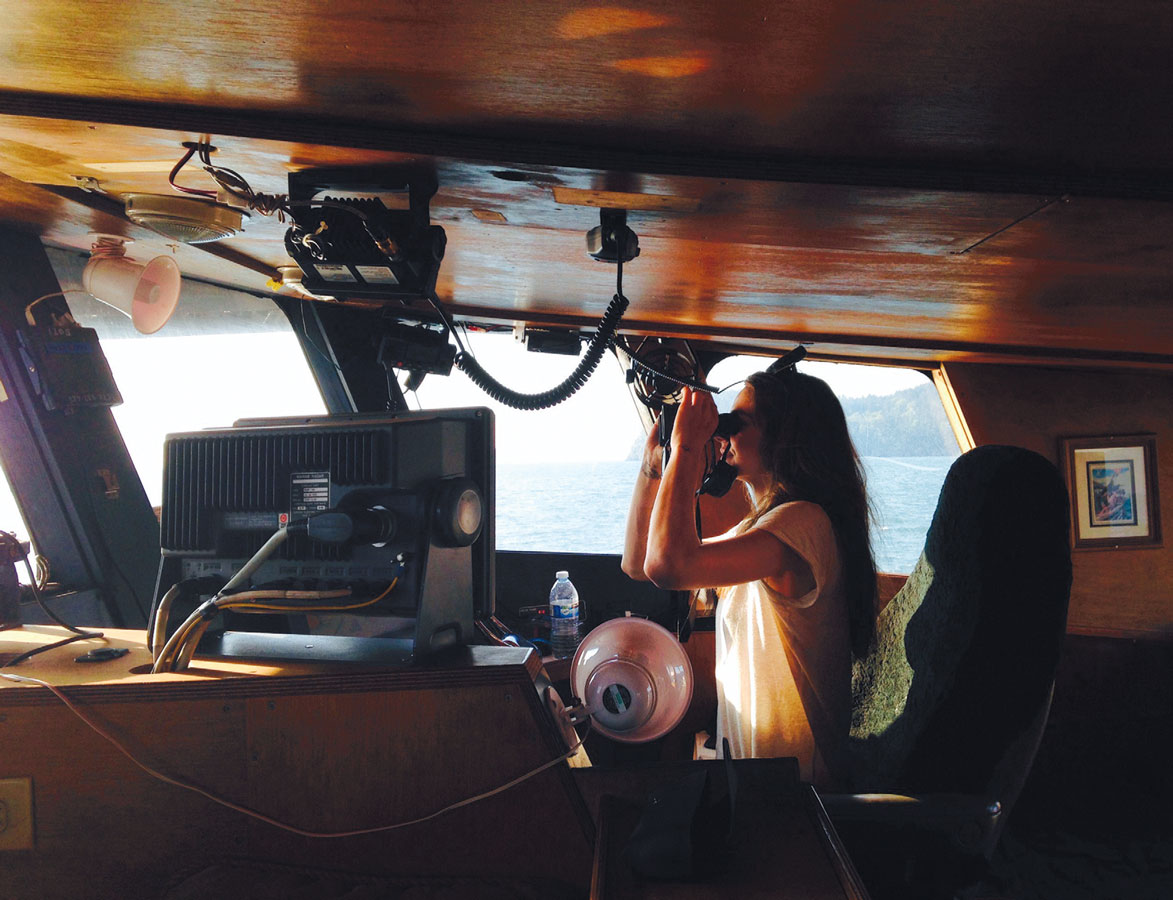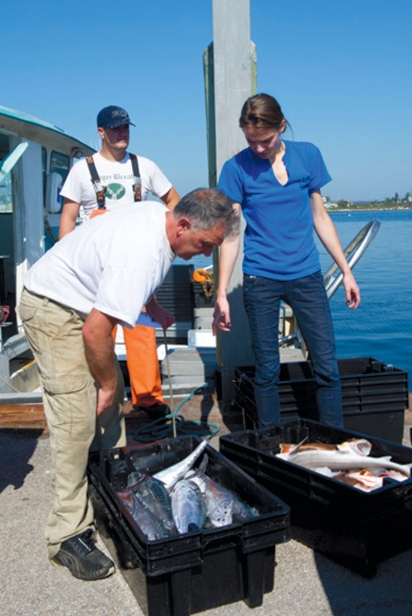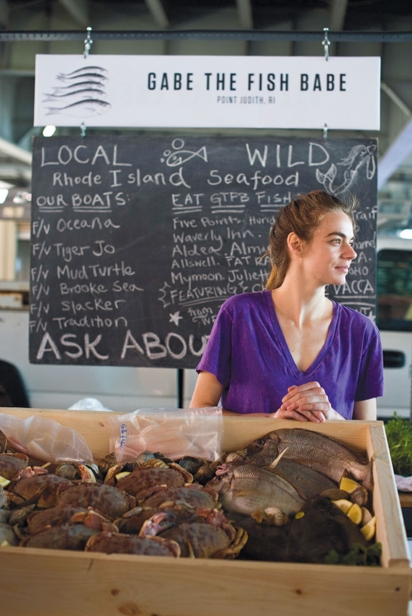Every Fish has a Story
Back in the early 90s I became an eight-year-old food-business entrepreneur in Woods Hole. Every Saturday morning I would semi-reluctantly trot my woven breadbasket and my Jack Russell Terrier Hayse-Dog down to the Community Hall. Upon arrival, I would station myself on that cement block, the one right before the firehouse, to dole out my mother’s crispy, still-warm baguettes. You might remember these times. There was Stan the Barefoot Farmer, the lady who hand-painted shoes (ahead of her time), the steadfast Vine sister with her meticulously hand-knitted wares. George was selling his vibrant, beach-y paintings, and there were others…
Mysteriously, I remember all of this like it was yesterday, although more than two decades have passed. I still have the basket I carried the bread in. It’s in my apartment in Brooklyn. Sometimes, when my Oregon foragers send me a package, I will use this same basket to deliver their morel mushrooms and truffles around my neighborhood. The nostalgia doesn’t seem to fade. It is unbelievable to me that this basket has managed to stick around for so long, through so many different phases of my life. My family is salty and tough, not sentimental or nostalgic. We usually throw things away, to make room for the new.
When I meandered into town, alone, with the dog and the bread, adults would judge—Where is your mom? Aren’t you too young to be selling in the street? I was born in 1984; Woods Hole has always been a safe, sleepy town. Even though things were “different back then,” my mom still may have been considered overzealous in encouraging me to be so fiercely independent. She pushed me out the door, even when I was scared. She made me figure things out without her, and set me free into the world in this way. It may have been risky; nowadays something like this might not fly, understandably. But, I know now that these times counted as the grass-roots beginnings of my career as a serial-entrepreneur in the seafood business. Through these early experiences of selling food I learned that achieving my dreams of culinary entrepreneurship were dependent on my self confidence and my energy to put an idea into motion.
It can be very, very difficult to start and run a business, which is why most fail and never try again. People will tell you that it is hard. You tell yourself that it will be hard. Nonetheless, one easily forgets about how hard it is all supposed to be, especially when push comes to shove. Hard is normal in startups, it is normal in a business where you deal with perishable items as well. But hard is not synonymous with impossible, and I believe that if one keeps on searching, one will find a solution to every problem—in business and in life. When we practice this concept, we are immune to failure. We rise up over and over again, because we know that nothing will stop us. Resilience is the reason why I am still in the fish business!
For two long years in my mid-twenties I worked at Pierless Fish in the Brooklyn Navy Yard. Pierless sells fish to famous chefs in the city and all over the country. After about six months of attempting to sell my father’s Boston-landed haddock out the back of my Toyota to high-end New York chefs, I realized that I had a thing or two to learn about business and the seafood industry. I asked Pierless for a job and luckily, I was hired on the spot. I remember them saying I was green, but enthusiastic. They liked that I was a Cape Cod native. They liked that my father was a commercial fisherman. I thank the universe that my unique seafood story has always sold itself. I learned a ton from that job. Net fillet yields, signs of freshness or lack thereof—these concepts became my areas of expertise. I learned about accounts receivable and the seasonal timetables of the species I was involved with marketing. I learned how to work with people I did not necessarily like. I learned that I need to control my temper and that I have no patience for nonsense.
Most of all, I learned where I would fit into the seafood industry. I researched and sold all of the species I would end up selling for myself at Gabe the Fish Babe. I was amazed to see that chefs were not really buying some of the local, underutilized species like dogfish, skate, and bluefish, fish found abundantly in Cape Cod waters, and for a reasonable price. “This seasonal fish is a much better option for local sourcing, pricing, and freshness,” I thought—not to mention the positive impact it would have on the local fishing community. Why on earth are top chefs paying out the nose for farmed European fish when they have the cream of the crop, right here? “Let’s give some spotlight to these underdogs,” I mused. Well, things in the seafood industry sure have changed in the past eight years. There are about 30 new fish companies in the domestic industry now based on the seasonal, local model—and the rest wish they could get in on the action!
Starting my company Gabe the Fish Babe at age 27 was completely terrifying. I think I spent at least the whole first year in a state of pretty severe shock. Once again I drew on my mother for strength and support. She invested in my concept and she believed in me. I did well. I paid all of my bills on time, always, and my customers paid me without much ado, also. The abundance of press was helpful. My business was profitable, so after three years when I had to close the shop I was able to make it out with decent savings.
I was reeling from the experience of closing the warehouse. I felt like a huge part of my soul was ripped out of my chest. My sense of identity and worth seemed to close down with the business. At the time, it was tough to understand that closing was the best thing that I could have done for myself and my career.
I escaped to the West Coast. I needed to find solace, and find out who I was apart from being Gabe the Fish Babe, and I needed to be very far away for that difficult process.
I found a temporary position through friends on a gill-net boat headed from Port Townsend, Washington, to Cordova, Alaska. I had done boat work for my father in the past and decided this was the opportunity I was looking for. More learning experiences ensued as I grinded and painted and remembered again how hard the people in the fish business must toil, from the dock to the dish. The scenery of the Inside Passage was beyond incredible. Our motely crew was a bunch of salty, hilarious New Englanders. As I meditated at sea, without any technology or any other crutch to distract myself from myself, I really began wondering if I was meant to be doing something other than seafood. I made lists. I explored other possibilities. When I got back to land I visited my brother in Humboldt County. I did video documentary work for Vice in Portland, Oregon. I worked at an Ibogaine rehabilitation center in Mexico. I made a ton of art, sold a lot of interesting objects, but nothing stuck for me like the fish did.
I missed my business immensely and realized that somehow I wanted to get it back. I spent two years out west, but eventually my longing for Northeast sensibility and practicality was too much to ignore. I came home. Despite the difficulties that can arise when it comes to a mom/adult daughter relationship, I was welcomed back to my home in Woods Hole by my amazing mother. I stayed the entire 2015-2016 winter on Cape Cod. It was brutal. I had not spent a winter on the Cape in about a dozen years. However, it was just the launching pad I needed to get back into the seafood game.
Today I have found partnerships in the seafood industry that work for me, and for my partners. I am using my past experiences to not recreate the stress-mess I found myself in when I closed my warehouse; business is not everything, we are human beings. I don’t just do it for the money. I also do it for the service. For the people I feed and educate. I do it for the fishermen and out of pure, unconditional love for the ocean.
The moral of my story is this: never give up! Have some patience, because you will get what you want eventually. And the journey, although crazy, painful, scary, and ridiculous, is always the best part. When you work hard and are truly in your element, others will notice. People will want to help you, and there will be a few or maybe just one person (mom!) that will stand behind you no matter what. But you gotta grind! Start looking at every obstacle as an opportunity in disguise. Have faith in yourself and follow your passion. If everyone did, I dare say that this planet would be a whole lot different!
Thank you for reading the story of my personal journey in the fish business.







